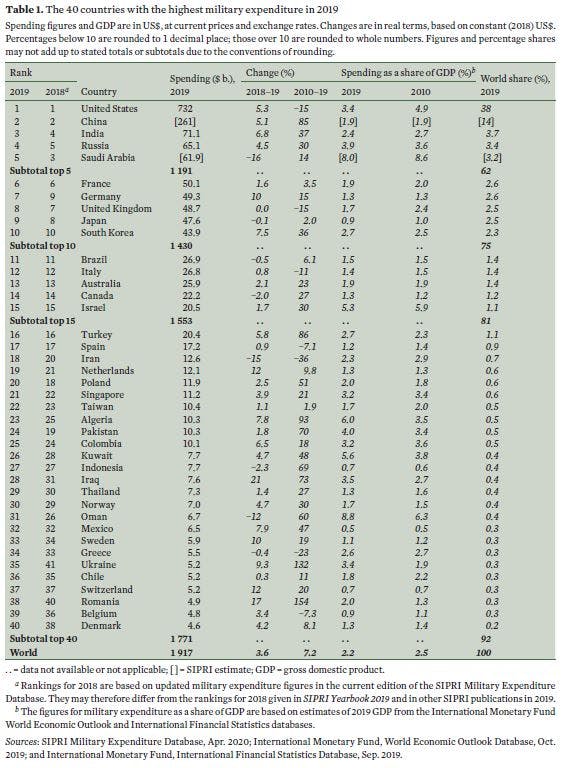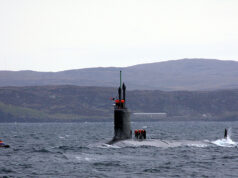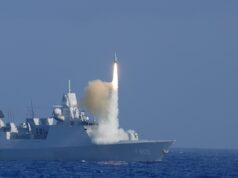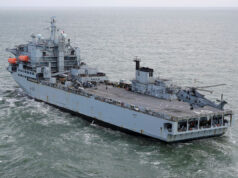Total global military expenditure rose to $1917 billion in 2019, according to new data from the Stockholm International Peace Research Institute (SIPRI).
The total for 2019 represents an increase of 3.6 per cent from 2018 and the largest annual growth in spending since 2010. The five largest spenders in 2019, which accounted for 62 per cent of expenditure, were the United States, China, India, Russia and Saudi Arabia. This is the first time that two Asian states have featured among the top three military spenders.
Global military spending in 2019 represented 2.2 per cent of the global gross domestic product (GDP), which equates to approximately $249 per person. “Global military expenditure was 7.2 per cent higher in 2019 than it was in 2010, showing a trend that military spending growth has accelerated in recent years,” says Dr Nan Tian, SIPRI Researcher. “This is the highest level of spending since the 2008 global financial crisis and probably represents a peak in expenditure.”
The report also states:
“The top 15 military spenders in the world in 2019 were the same as those in
2018, but there were some significant changes in the rankings among the highest
spenders. Together, the top 15 countries spent $1553 billion in 2019, accounting for 81 per cent of global military expenditure.”

All but three countries in the top 15 had higher military expenditure in
2019 than in 2010. The exceptions were the United States (–15 per cent),
the United Kingdom (–15 per cent) and Italy (–11 per cent). China’s increase
(85 per cent) was by far the largest among the top 15.”
United States drives global growth in military spending
Military spending by the United States grew by 5.3 per cent to a total of $732 billion in 2019 and accounted for 38 per cent of global military spending. The increase in US spending in 2019 alone was equivalent to the entirety of Germany’s military expenditure for that year.
“The recent growth in US military spending is largely based on a perceived return to competition between the great powers,” says Pieter D. Wezeman, Senior Researcher at SIPRI, in a news release from the organisation.
China and India top Asian military spending
In 2019 China and India were, respectively, the second- and third-largest military spenders in the world. China’s military expenditure reached $261 billion in 2019, a 5.1 per cent increase compared with 2018, while India’s grew by 6.8 per cent to $71.1 billion.
“India’s tensions and rivalry with both Pakistan and China are among the major drivers for its increased military spending,” says Siemon T. Wezeman, SIPRI Senior Researcher.
In addition to China and India, Japan ($47.6 billion) and South Korea ($43.9 billion) were the largest military spenders in Asia and Oceania. Military expenditure in the region has risen every year since at least 1989.
Germany leads military expenditure increases in Europe
Germany’s military spending rose by 10 per cent in 2019, to $49.3 billion. This was the largest increase in spending among the top 15 military spenders in 2019.
“The growth in German military spending can partly be explained by the perception of an increased threat from Russia, shared by many North Atlantic Treaty Organization (NATO) member states,” says Diego Lopes da Silva, Researcher at SIPRI.
“At the same time, however, military spending by France and the United Kingdom remained relatively stable.”
There were sharp increases in military expenditure among NATO member states in Central Europe: for example, Bulgaria’s increased by 127 per cent—mainly due to payments for new combat aircraft—and Romania’s rose by 17 per cent. Total military spending by all 29 NATO member states was $1035 billion in 2019.
In 2019 Russia was the fourth-largest spender in the world and increased its military expenditure by 4.5 per cent to $65.1 billion. ‘At 3.9 per cent of its GDP, Russia’s military spending burden was among the highest in Europe in 2019,’ says Alexandra Kuimova, Researcher at SIPRI.
Volatile military spending in African states in conflict
Armed conflict is one of the main drivers for the volatile nature of military spending in sub-Saharan Africa. For example, in the Sahel and Lake Chad region, where there are several ongoing armed conflicts, military spending in 2019 increased in Burkina Faso (22 per cent), Cameroon (1.4 per cent) and Mali (3.6 per cent) but fell in Chad (–5.1 per cent), Niger (–20 per cent) and Nigeria (–8.2 per cent). Among Central African countries that were involved in armed conflict, military spending in 2019 rose overall. The Central African Republic (8.7 per cent), the Democratic Republic of the Congo (16 per cent) and Uganda (52 per cent) all increased military spending in 2019.
Volatile military spending in African states in conflict
- South America: Military expenditure in South America was relatively unchanged in 2019, at $52.8 billion. Brazil accounted for 51 per cent of total military expenditure in the subregion.
- Africa: The combined military expenditure of states in Africa grew by 1.5 per cent to an estimated $41.2 billion in 2019—the region’s first spending increase for five years.
- South East Asia: Military spending in South East Asia increased by 4.2 per cent in 2019 to reach $40.5 billion.
- The average military spending burden was 1.4 per cent of GDP for countries in the Americas, 1.6 per cent for Africa, 1.7 per cent for Asia and Oceania and for Europe and 4.5 per cent for the Middle East (in countries for which data is available).
SIPRI say that it monitors developments in military expenditure worldwide and maintains the most comprehensive, consistent and extensive publicly available data source on military expenditure. The data is accessible on the Military Expenditure Database page of SIPRI’s website.
“All percentage changes are expressed in real terms (constant 2018 prices). Military expenditure refers to all government spending on current military forces and activities, including salaries and benefits, operational expenses, arms and equipment purchases, military construction, research and development, and central administration, command and support.”
Read the Full Report in PDF.














and why do we still give aid to India?
In some circumstances, aid is another method of entry into their market?
We don’t.
We don’t give a penny to the Indian government
We invest a small amount of the DfID budget in Indian enterprise and job creation with the aim of making money for British companies and creating jobs for British workers
Whilst at the same time giving our diplomats something juicy to hand over the table when they’re at meetings with their Indian counterparts, firmly placing Britain in the best possible light in the eyes of the Indian government, which would be helpful seen as India is a potential superpower
It’s called geostrategy & soft power Dan, something the British tabloids know absolutely nothing about
thank you fair enough it is the sprat to catch a mackerel.
just seen the DfID budget and we no longer provide it – good!
Aid isn’t really ‘aid’ in this context. On a nation-state level it’s about soft power – so we should be as generous as possible.
This old chestnut again….what countries really want is access to markets…aid just goes into the hands of well paid CEOs of NGOs and into Swiss bank account. There is no evidence to relate aid to soft power….fiction…fiction…fiction….
Peter
The global soft power index that measures the soft power rankings has engagement through diplomacy and contributions to global development as one of its six measuring categories with foreign aid a specific and important metric in that category
That’s a fact, the only fiction is in your head
You have already lost the argument SoleSurvivor when you resort to insults….Overseas aid will continue to disliked by the majority of the general public in the UK and that 0.7% is destined to go down to probably to less than 0.1% of GDP. Personally I would like it to go completely but any percentage reduction is a win at this stage. Numerous studies have shown that trade not aid…a hand-up and not a hand-out…works much better. Better to do trade, set up businesses and enable people to develop their own companies and businesses than lining the pockets of well paid CEOs of NGOs like David Milliband…Tony Blair….looks like there is a pattern emerging here…Oh yes all those Champagne socialists….Also love all those Muscians like Bono that perform charity concerts which they use to offset their tax liabilities whilst they invest in dodgy tax avoidance schemes and send all their money into tax free regions of the world….biggest scam in the world…they look like they are Saints when they are sinners….Indeed people like Bono I see no different from many third world dictators putting their case in Swizterland, Luxenbur or the Barbados. Charity is just one big scam apart from local charities with un-paid volunteers that work in the UK with the homeless and physically disabled…These get a big vote for me and I’m happy my taxes get paid on such things….not overseas aid though. The only overseas aid that is beneficial in my opinion is disaster relief and vaccination programmes. In that sense both disaster relief and vaccination programmes should be done through our military rather than NGOs with expensive charity CEOs and potentially abusive of power like in Haiti and Africa as many charities don’t yet their personnel properly. I could go on and on but I’m suspecting you only have one point of view.
You lost the argument last week when you failed to produce any evidence whatsoever and not a single fact in your argument, you actually thought the Soviet Union fell because of a trade embargo, that’s the level I am dealing with here
This is the fifth time I have asked, how much of the 2019 aid budget went to African dictators??
I have already explained to you what and how the aid money gets spent, it’s not all given away and it doesn’t all go to
NGO’s, it’s a complex system that’s been explained to you and you cannot grasp any of it, you keep banging on about “studies” how many studies do you think there has been over the past 50 years about the benefits of it that you fail to mention, that outnumber your studies but the hundreds to one
“Charity is just one big scam apart from local charities with un-paid volunteers that work in the UK with the homeless and physically disabled…These get a big vote for me and I’m happy my taxes get paid on such things”
And now you have really shown your level, the old all charity is a scam argument, god forbid an old lady standing in the rain with a bucket for Marie Curie be paid a wage ey, how dare she, the rotten old bat getting paid minimum wage to raise money for nurses giving end of life care for the terminally ill
Make sure you don’t need air lifted to hospital Peter, especially if you’re in the North West because the air ambulance is a charity mate, if you’re in the back, make sure you stick to your principles and make sure the pilot gets some stick for getting paid, and what he’s doing is a scam
Have you got a message you would like to give to the kids in great ormond street hospital? Or the kids nationally that phone the NSPCC because they’re getting abused?
What about all the terminally ill cancer sufferers getting end of life care by Macmillan and Marie Curie? Why don’t you go in and tell them all it’s a scam, the nurses giving the care are not real, British legion? Guide dogs for blind people? RSPCA? The lifeboats RNLI
That viewpoint that charities are a scam because people get paid is so bizarre, people happily spend thousands a year on crap from Amazon lining the pockets of the richest man in the world yet they think charities that they give a quid in a bucket to should be this magical organisation where everything like organisation, advertising, HR, finance, training, equipments, ordering, dealing with potentially millions of pound of donations be ran by an unpaid volunteer with a pen and notebook, it’s so bizarre and frankly stupid to think that a CEO of a large charity should not be getting paid
I think you’ve won this round mate…..
It’s not really aid, it’s investment in companies and projects that help us with trade in India.
UK spending as share of GDP is 1.7% according to this. Not the 2% trumpeted by HMG which we know to be cobblers.
Because HMG ridiculously count pension payments to increase the figure to 2%. Nobody else does this and nobody else is fooled by it. The 1.7% is therefore the true figure. Although these figures relate to 2019 and we know this years GDP will be reduced so by fluke the 2020 figures will probably be 2% or above.
I’m not convinced that these figures are correct. For a start they show the UK spending 1.7% of GDP on defence when the UK Govt claims to have met its 2% commitment (yes, I know they include pensions and other expenditure that shouldn’t really be included – but so do other countries).
I agree. If you look at the ISS studies, they disagree and put the u.k above France and Germany.
https://thinpinstripedline.blogspot.com/2020/04/hey-big-spender-is-uk-really-spending.html
“At the same time, however, military spending by France and the United Kingdom remained relatively stable.”
Since when has -15% since 2010 been classed as “stable”
I think it was referring to 2018-19 budgets being stable not over the time frame you mention.
All but three countries in the top 15 had higher military expenditure in
2019 than in 2010. The exceptions were the United States (–15 per cent),
the United Kingdom (–15 per cent) and Italy (–11 per cent). China’s increase
(85 per cent) was by far the largest among the top 15.”
Post-COVID military budget strategy across the World will be very interesting. The longer the lockdown continues the less money will be available over too many government departments? The fate of the US economy will also be a major factor for many countries, and significant pruning of the DOD budgets in recent years, could be further compounded by the current crisis?
The USN has announced it is going ahead with the FFX frigate program, will build the first 10 frigates.
So the US will just go over 4% of GDP on defence.
So Germany spends a bit more than the UK, yet has no nuclear arms, SSBN, SSN, or Carriers, big ticket items.
Where is their money going? I know they have more armoured vehicles, tanks, fighter aircraft, and helicopters, but we keep reading here their military is barely operational.
Is this really true?
I think it comes down to wages mate, they have 37000ish more active service personnel and 9000 more civilian support staff. I’m pretty sure the French figures are slightly low as I’m pretty sure their nuclear deterrent comes out of central government like ours used to.
Hmmm. The question of the deterrent. I’d love a definitive answer to that, regarding France and the other nuclear powers. Defence budget or central government, as you say.
The pension and deterrent costs in core are really causing problems. Where are the journalists asking these key questions either of the PM or the DS.
They need calling out whenever the 2 % mantra is mentioned.
The news media & most politicians don’t seem to be interested in defence, until TSHTF, when that 3% difference results in probably disproportionate weakneses & losses.
I totally agree mate, our limp wristed left wing media are constantly trying to influence the public on the defence issue. Every time a SDR comes up and they announce a new project, it’s always “with that money, we could save the polar bears or build 500 new hospitals”. This immediately puts the publics backs up and causes problems.
I wonder if a freedom of information request would tell us?
In my opinion, the Nuclear deterrent should be paid for by the Government…….. not the defence budget. This saving could be used for investing in new equipment and more manpower, which we desperately need.
They’ve been going on an equipment purchasing splurge, the recent announcement of plans to order 93 Typhoons and 45 Super Hornet/Growlers is an example.
The House of Commons Defence Select Committee concluded in 2017 that defence expenditure, excluding pensions and other dodgy additions made by HMG, was 1.7% of GDP.
The SIPRI analysis comes to the same conclusion.
Nobody buys the tricks HMG used to claim 2% of GDP, except of course the Tory tabloids. HMG seems perfectly happy to fool the great British public but our NATO and Commonwealth allies musr see us as a nation of tricksters and fibbers.
The Opposition in Parliament really needs to hammer this 2% fake news each time it is trumpeted by the PM and Government ministers.
I wish they would, and I wish Trump knew.
You maybe right but……. Labour can’t really stand up and criticise the Government when they’re a party of pacifists who would bin pretty much everything we have, including our Trident systems and the submarines that carry them.
It doesn’t matter that Corbyn has gone from the top job, he still holds a lot of influence in the party and we all know his opinions on defence. Labour are no friend of the Armed Forces, never have been… never will be.
It might be Graham but I would of thought that would be financial years 2020-25
my only fear is when this virus has finally gone and done one,what damage will be done to the existing or future dense budgets,because past governments always use the defense budget as a backup piggy bank.
I don’t think they will be getting much change out of the 1.7% of GDP budget myself, considering the hundreds of billions involved, it would barely dent it. There is little left to cut.
They have taken much of this money from the Bank of England, which we own anyway.
No more austerity. Invest and spend.
Austerity in the NHS has really made the Covid outbreak far worse than it need to have been.
Why do you think that? Adding 1000 extra ICU beds would have had little impact on the need to lockdown and stifle economic growth. What held us back is the ability to mass test. Germany has faired well here and the irony of that is their use of private labs was baked into their health system so could ramp up quickly. What’s hampered the UK is the lack of intelligent debate, you can’t mention private and NHS in the same sentence anymore even if the end result is a better service or saving lives, its now dismissed without discussion. Once we stop using the NHS as political football we’ll be able to improve it. Germany only spend 1% more than us but gets way more than 1% of services in return.
Correct, spot on.
140 Billion quid for year 2019/20 isn’t quite austerity is it…..
What austerity in the NHS? There’s never been more investment in our health service than at any time in its history. What we need to do is ask why the pharmaceutical industry charges the NHS so much and stop immigration and stop so called “health tourism” which is a massive and expensive issue.
The old adage of capitalism, ‘speculate to accumulate’!
The ‘unless you’re a government, because that makes you communist.’ bit is always missed off for some reason.
The weight of research from the past decade is favouring the theory that austerity has been an unsuccessful ideological pursuit. Committed strategic investment, which the latest budget seemed to start to refocus on is often posited as the more viable alternative. But to be most effective would require tax reform and non-light touch government; neither are things the Conservative party is interested in being associated with. Nor is effective defence spending, other than occasional rhetoric, apparently. And the whole thing, the driver of austerity, stems from countries s******g themselves over what a handful of archaic companies have to say about national credit ratings; companies that make a fuss about government borrowing to try and stay relevant. The world now runs on debt, countries need to get comfortable with that.
The UK spends >2% of GDP on defence annually based on how NATO defines that expense. It has done so since at least 2013. Just do a search for “Defence Expenditure of NATO Countries (2013-2019)” for the PDF from NATO. SIPRI presumably uses a different basis for what to include in its estimates. There is no vast UK conspiracy to hide numbers.
We can certainly debate whether the UK should be spending more (or not) in absolute terms but focusing on 2% of GDP (as if this is some magic figure of merit rather than just a NATO guideline) and whether pensions and nuclear defence should be included or not is irrelevant. Moving pensions and CASD out of the defence estimates doesn’t magically mean that the defence budget stays the same.
It’s not at all irrelevant. It is a conspiracy, a con to fool the electorate & paint a false rosey picture of the defences of this nation. The army, air force & navy have not been weaker than they are now for centuries(but the air force is just over 100 years old of course). For what it costs us, we get precious little in capability unless you think precipitating a global nuclear Armageddon is a good idea. We’ve had cut after cut for decades & it’s gone too far, hazarding out security & our servicemen & women.
Frank, I don’t know how you define “weaker” but how about we consider that we are neither trying to grow or defend an Empire anymore. Let’s further consider that we are no longer facing the Warsaw Pact. In fact all countries of the Warsaw Pact outside the USSR are now members of NATO. In fact even some countries that were within the USSR are now members of NATO and other former members of the USSR are certainly not aligned with Russia. So basically the putative enemy is Russia … and every major European country including Russia has smaller armed forces today.
Now consider that the UK does not fight alone, and certainly not against Russia. Even without the US, the remaining members of NATO would prevail against Russia in a longer term conventional war. The threat is a fast moving cohesive Russia aiming for short term territorial gain/domestic diversion and relying on a slow response from a multi-national bureaucratic NATO. Hence one reason why NATO is conducting multiple large multi-national exercises.
Note though that I didn’t say the UK shouldn’t spend more. I simply point out that focusing on 2% as some magical number is irrelevant. The issue is not what percent of GDP is spent but are we spending appropriately for the defence we perceive we need. But to say we should spend more should be justified by the threats we face, not a comparison to historic levels.
I would agree with that analysis. Although, in the short term I am concerned that the growth in Russia defence spending and an increase in aggressive activities from Russian forces in and around UK and NATO waters and the Middle East needs a response.
Also, China will pose a threat at a global level in the not too distant future. They have already instigated regular visits to the Russian Baltic Fleet exercises, so clearly are aiming to develop a true global blue water navy. They are some way off challenging the USN and NATO in blue operations, but I beleive that is their eventual goal.
Our conventional forces are still formidable in many respects, but they lack ‘depth’ and that can only be rectified with increased numbers. If we are to contribute to the West’s response to China we should start a slow and gradual build up now so that China is always chasing a rising bar.
Two other concerns that worry me. Ben Wallace is on the record as saying we can no longer rely on the US in future military operations. Whilst I suspect that he was refering to out of area operations it is a cause for concern in the context of increasingly assertive out of area Russian activities and China’s grow military reach.
The other big concern is what will be the response to the Covid-19 pandemic. It is clear that the Western economies are going to be seriously hammered. Do our glorious leaders go for more austerity or spend their way out of the coming depression?
Depending on how the West responds to the fallout from the pandemic China could move decisively closer to its’ goal of global dominance.
So yeh, 2% is a silly thing to argue over. Can we safe guard out way of life for our children and grandchildren? Or taking a Chinese style long term view, our great-great-grandchildren…
Hi CR. With Russia I am less concerned, provided there is political will across Europe for defence with rapid (which is key) response to any potential Russian aggression. European NATO allies are continuing to invest in modern warships, AIP and nuclear submarines, modern aircraft (stealth or otherwise). Land forces might be a concern, but less so if Russia fails to control the air, the latter clearly being a focus for NATO. I tend to automatically discount the US contribution, not because I think its an issue (although its certainly a possibility) but because Europe should be capable of its own defence. Another reason for measured response, is that Russia, whilst nominally aligned with China, also has to recognise the risk of a European theater conflict and how China might act against Russia in the east in such a situation. Russian paranoia (if that’s really a thing today rather than just an excuse for bad behaviour) must surely also include memories of what happened with the Molotov–Ribbentrop Pact.
China is definitely the concern. The scope and scale of how the UK wishes to proceed beyond token signals east of Suez, or indeed outside NATO anywhere in the world, is heavily linked to UK defence expenditure. That said a CSG complicates calculations, even if deployed rarely to the Indian Ocean or Pacific. Without it the UK is just another country with decent AAW destroyers and ASW frigates, but too few to affect any balance of power in Asia; quite a few countries in Asia have those already. Few are on a path to carriers with a 5th gen air wing capability of a QE class.
I agree, it is the case of NATO getting its act together quickly.
Give over Frank…… you’ve been reading too much on the Internet mate.
The RN has fewer warships than it has for centuries & can’t meet it’s even peacetime tasks, The army is tiny & the RAF smaller than it’s ever been. What we do have is overpriced & spun by politicians so casual observers think all is rosy. HMG trots out that the RN is growing when all it is doing is marking time, if that & doesn’t have the funding to even cover that without further cuts.
All true & verifyable.
The obvious point that GHF misses here is that, by sliding pensions and nuclear programme costs and probably a good slice of GCHQ into the defence budget,
* Defence expenditure was cut by a further, unannounced and unrecorded, 15% – we have subsequently had 17/20ths of the previous budget
* The Home Office, Treasury and DWP have unloaded a good chunk of their spend on the MOD, but they are not primarily defence costs – Government pensions are paid through DWP, they are not hypothecated by individual departments, so the inclusion of pensions in the MOD budget is just three card trickery. GCHQ and cyber are part of the Home Office Intel remit, not the MOD’s bag at all. And the whole basis of the independent nuclear deterrent was that, as a key national strategy, it would be funded directly by HMG – Parliament would not at that time have agrèed to squash it into the strainedatabase defence budget.
The 2% minimum spend is a NATO recommendation and one that most nations are trying to move towards. We instead have explored all the loopholes in how NATO classes defence expenditure and exploited these to the max.
It is a real accountant’s con job by HMG and then they have the temerity to boast about us meeting the 2% target and being one of the big NATO players.
Hi R C.
Agree with almost all of your post. Well said.
Just a few small notes that GCHQ do not fall under the Home Office, that is the Security Service. ( MI5 )
GCHQ are the responsibility of the Foreign Secretary, but are not a part of the F&CO.
With the creative accounting that you have rightly outlined there have also been comments over the years here that the budget for the intelligence agencies ( SIS / SS / GCHQ ) is included.
This is called the SIA “Single Intelligence Account” and I have seen no proof at all that that money ( over 2 billion ) has been shovelled in to MoD budget by Osborne. I would like to see proof and so far no one has provided it for me, despite a couple of people over the years here saying it is included.
As far as I am concerned only Defence Intelligence is included, rightly so as it is part of MoD.
On Cyber, MoD are actually heavily involved, there are tri service Cyber units.
Later this year a joint MoD / GCHQ Cyber force may be formed.
Cheers. The inclusion of pensions is an absolute disgrace!
Hi Daniele. If interested you can see my responses to Frank and RC above. I feel there is too much focus on 2% as a number and what it does or does not include, rather than focus on what we need to do and whether that is adequately funded.
Morning GHF. I did read it. Yes fair comment.
At the end of the day with HMG and MoD financial incompetence around I feel that needs sorting above all.
There needs to be a proper strategic plan endorsed by all parties and stuck with. And that plan should not be lets disarm!
Hi RC. Down the rabbit hole we go once again on 2%. Note that I didn’t say the UK shouldn’t spend more. I simply point out that focusing on 2% as some magical number is irrelevant. The issue is not what percent of GDP is spent but are we spending appropriately for the defence we perceive we need. Would you be happy with 2% defined any way you like, if in fact we should be spending 5%? But to say we should spend more than we do today should be justified by the threats we face, and especially the role we want to play outside the European theater and outside NATO.
Hi Glass half full.
I have checked the figures of the spreadsheet and agree with you. I have also posted on here with my account of how are accurate are the rankings.
Cheers,
George
Sad we don’t have a great deal to show for it: Historically tiny conventional forces. Two places above Japan(a fair analogue to UK-developed Island trading nation) but only about half the size of its fleet. We must stop the current procumement system where just one or two corporations overcharge us like some sort of cash cow, so we get the kit we need in the quantities nessecary.
It’s not all the likes of BAE’s fault, however.
Part of the problem is the MoD and HMG. Take the QE carriers for example. Early on it was decided that they would be STOVL carriers using the F35B. Then David Cameron’s goverment announces that they’re going to use F35C instead, and later changes its mind back to the original STOVL F35B as they realise that to change the carrier design halfway through being built would cost more than they would save on buying F35C vs B.
Similar with a lot of our ships; HMG/MoD start making changes once the design has been finalised and constuction begun, and that’s when it costs a lot more money to change it back.
TBH re: the QE carriers. I think we should have made them STOBAR and then we could have gone with F35B, C, F/A-18 Super Hornets, or a combination.
Another issue is that HMG want everything gold-plated and shiny. This is why we spend £70-odd million per Typhoon and then use them to bomb four Jihadis in a Toyota Hilux, when a drone, a Harrier, or even a Hawk could have done the same for a fraction of the price.
I don’t think F-18 or F-35C would proform well using STOBAR, without having vectored thrust. F-35B and Harrier. would be ok.
I agree entirely.
I don’t think its HMG that want everything shiny and gold plated. They’d be quite happy to hear from the services that could bomb ISS in a modern day equivalent of Sopwith Camel and then cut as appropriate.
Hi folks hope are all well.
I have checked some of the figures on the above rankings, and I’m slightly puzzled by the UK ranking of 8th.
Upon looking at NATO’s 2019 expenditure, the UK is 60.376 billion $ making it second after the US, and Europe’s largest defence budget. Although there are issues around GDP defence expenditure being 2% or 1.7? Other factors need to be considered. For example, French defence budget also includes the Gendarmerie at 7.7 billion Euro.
In addition, according to the NATO current figures France defence budget is 50.659 billion $ and Germany at 54.133 billion $. Both falling behind the UK.
So I’m asking those of you that are more knowledgeable in such matters, would rank the UK. I’m not convinced the figures are correct.
But of course all budgets will be adjusted post covid19. All advanced nations will have to review their defence budgets, Germany may have to scale back on it’s spending spree.
Cheers,
George
Hi, does Russia’s figures include hidden subsidies to its defence Industries?
This post is based on Stock Peace Institute always had different contradicting figures. Lets also not forget countries like China and Turkey due to devalued currency and high productivity can produce more military hardware than a country with higher budget high cost labour and overheads
With current trends China will dominate Asia and Far East .Russia Eastern and Northern Europe possibly Mediterranean if it gets its way in Libya. Turkey South Eastern Europe North Africa and Horn of Africa
European states lack the man power will and determination to be 21s century powers and recognise not their political influence and economic decline too. Britain needs to wake up post brexit.
Hi Alex, quite right about the need to “wake up”, we and many others on this site have been saying so for a long time. The politicians must protect the nation’s interest, this may mean having to review the defence budget in upward move rather than cut. Obviously post covid19 will impact all defence budgets, nonetheless, the UK must take stock of it’s post Brexit status.
Cheers,
George
See the Thin Pinstriped in blog for further commentary on this- particularly re. SIPRI methodology.
I’m not sure about these figures, especially the German aspect whereby they spend more than the UK? Here are the NATO official figures, look at page 7- the UK clearly spends more than France and Germany here. Could it be different accounting methods between SIPRI and NATO? https://www.nato.int/nato_static_fl2014/assets/pdf/pdf_2019_11/20191129_pr-2019-123-en.pdf
We, as a Country, need to invest more in our defence but its hard to do this with the ever critical left wing media constantly bleating about how many penguins could be saved or some other crap, if we don’t spend spend spend on our National security and defence. This anti defence spending, limp wristed, left wing media try to whip the public up into a frenzy if they find out that the M.O.D want to increase our defence budget and they are, pardon the pun, bad news for our Armed Forces.